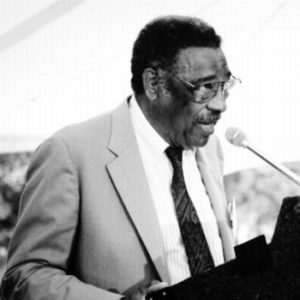
Samuel Proctor
*Samuel Proctor was born on this date in 1921. He was a Black minister, educator, and humanitarian.
Samuel DeWitt Proctor was born in Norfolk, Virginia. Proctor's grandparents on both sides had received education at the university level: his paternal grandmother had attended Hampton Institute, and both of his maternal grandparents had attended Norfolk Mission College. His parents, Herbert Proctor and Velma Hughes, met while they were both students at Norfolk Mission College.
Proctor was raised as a Baptist and attended the congregation founded by his great-grandfather, Zechariah Hughes, as a child. Herbert Proctor worked at the Norfolk Naval Shipyard in Virginia. Proctor graduated from high school in 1937 and enrolled at Virginia State College, having won a music scholarship to attend. During his time at Virginia State College, he played saxophone in a jazz band, along with pianist Billy Taylor, where they both joined the Kappa Alpha Psi fraternity. In 1939, he left Virginia State College without taking a degree and enrolled in the U.S. Naval Apprentice School to receive training to become a ship fitter.
He abandoned that line of study after only a year and, in 1940, matriculated at Virginia Union University. He married his classmate Bessie Tate while he was a student at Virginia Union University. He graduated with a bachelor's degree in 1942. He studied at the University of Pennsylvania for one year before enrolling as the only Black student at Crozer Theological Seminary in Upland, Pennsylvania, to pursue a career in the Christian ministry. Proctor's professors at Crozer had been highly influenced by higher criticism, and learning from them caused Proctor to question the literal truth of the Bible, leading him to question his faith. Proctor received a Bachelor of Divinity degree from Crozer in 1945.
Following graduation, he became pastor of the Pond Street Church in Providence, Rhode Island, and received a Ph.D. in Theology from Boston University in 1950. In 1950, Proctor was invited to give a lecture at Crozer Theological Seminary, his alma mater, and it was there that he first met and befriended Martin Luther King, Jr., who was a student at Crozer at the time. Proctor accepted a position as president of Virginia Union University in 1955 at 33. Shortly after he was appointed university president, King invited Proctor to Montgomery, Alabama, to speak; in the middle of the Montgomery Bus Boycott, Proctor delivered a "Spring Lecture Series."
He was among several Black leaders invited to the White House by U.S. President Dwight D. Eisenhower. In the wake of Brown v. Board of Education, Eisenhower asked these leaders to "ease off" on their demands for civil rights for Blacks. Proctor and the other Black leaders politely refused Eisenhower's request. As president of Virginia Union University, Proctor traveled extensively abroad; he lectured in the Soviet Union, toured the Auschwitz concentration camp, and attended conferences in Africa and the South Pacific. In 1960, Proctor became president of the Agricultural and Technical College of North Carolina (now North Carolina Agricultural and Technical State University).
Arriving in the middle of the Greensboro sit-ins, Proctor did not publicly support the student protesters, believing that quiet diplomacy was more effective than confrontation in advancing the civil rights agenda. However, behind the scenes, he and other school administrators raised money for arrested students and helped to find them lawyers. (Jesse Jackson was the college's student body president and quarterback of the college's football team.) Proctor had strong ties to the Kennedy administration. In 1963-64, he took a leave of absence from the Agricultural and Technical College of North Carolina to serve as associate director of the newly established Peace Corps chapter in Africa.
In this capacity, Proctor was living in Washington, D.C., during the March on Washington for Jobs and Freedom. He and his family moved to Nigeria shortly thereafter. He resigned on March 1, 1964, citing his desire to devote himself to public service. He was a supporter of President Lyndon B. Johnson's War on Poverty. In 1966, he published a book about the challenges facing young Blacks entitled The Young Negro in America, 1960-1980. In 1969, he gave a lecture on the first anniversary of the assassination of Martin Luther King Jr. at Rutgers University and became a Distinguished Professor of Education there until 1984.
In 1972, Proctor also assumed the pastorate of the 18,000-member Abyssinian Baptist Church in Harlem until 1989. Proctor later worked as an adjunct faculty member and/or visiting professor at Vanderbilt University, United Theological Seminary, Kean University, and Duke University. He was the recipient of 45 honorary degrees in the course of his life. In 1997, during a speaking engagement at Cornell College (in Mount Vernon, Iowa), Samuel Proctor suffered a heart attack and died on May 22, 1997.